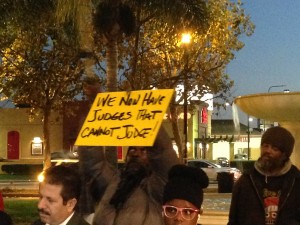 At Leimert Park, the man was holding a sign that said “We now have judges that cannot judge.” Midst chanting “No justice, no peace” and “Hey Ho, racist cops have gotta go” I kept coming back to this plaintive sign. It brought to mind the midrash which comments on the first verse in the Book of Ruth: “In the days when the chieftains ruled.” The Hebrew uses the same root for both noun and verb and has the more poetic: biymay shfot ha-shoftim. When the judges judged, perhaps. The midrash comments: “Woe to the generation which judged its judges, woe to the generation whose judges needed to be judged.” (Ruth Rabba 1:16)
At Leimert Park, the man was holding a sign that said “We now have judges that cannot judge.” Midst chanting “No justice, no peace” and “Hey Ho, racist cops have gotta go” I kept coming back to this plaintive sign. It brought to mind the midrash which comments on the first verse in the Book of Ruth: “In the days when the chieftains ruled.” The Hebrew uses the same root for both noun and verb and has the more poetic: biymay shfot ha-shoftim. When the judges judged, perhaps. The midrash comments: “Woe to the generation which judged its judges, woe to the generation whose judges needed to be judged.” (Ruth Rabba 1:16)
Police officers are part of the judiciary. When asked about the role of police officers in light of Jewish textual tradition, Rabbi Hayyim David Halevy the Chief Rabbi of Tel Aviv (in a small book called Dvar HaMishpat: Hilchot Sanhedrin 1:7) discussed the idea that the police are invested with judicial authority and not merely with punitive or protective authority. Therefore, the Talmud’s demand (Bavli Rosh Hashanah 26a) that a court has two obligations—both judging (deciding law based on the facts and testimony) and saving (attempting as best as they could to find a defendant innocent)—would also apply to police. This translates to the fact that police officers are in a situation wherein they are obligated to defuse, and deescalate a situation rather than to “put down” a threat.
We are now in a time when some of our police officers, and some of the officers of the courts, cannot or will not judge. They will not judge the judges. Woe to our generation for our judges surely need to be judged.

The police are not supposed to interpret the law, which is the role of the judiciary. The may be overstepping their role as part of the executive branch, implementing the law, and acting as if their role included interpreting, but that would be beyond their constitutional mandate. Does Jewish law say otherwise?
Whenever the police act they are interpreting the law in the sense that they are deciding that this act abrogates the law and this act doesn’t. In that sense they are “judges”, and at least an arm of the judiciary. In this way, at least Rabbi Halevy categorizes them as judges.
Saving whom exactly? I’m not sure what you (or Rabbi Halevy) mean by calling police part of the judiciary. Seems like very different functions. Their role should be not to favor one side or the other– it should be to dispense their obligations with sechel and dignity. As for judges, I believe a judge’s role to do justice– It is the law’s role to favor defendants.
Halevy understands that the function of policing is an extension of the judicial function. This is based in the fact that the Torah couples judges and “shotrim” which are understood to be those who have a police function (it is the modern Hebrew word for police) in Deuteronomy 16:8.
Saving the defendant. This is technically used to say that a judge who saw a person kill another person cannot judge that person’s case.